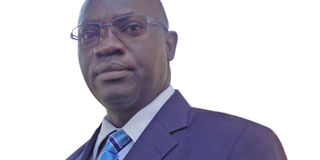Prime
I want to be remembered as the Ugandan Martin Luther

Mr Sewanyana
Tell me about yourself?
I am Livingstone Sewanyana, a human rights defender with 30 years of activism, a strong believer in social justice, equity, respect for human rights and rule of law.
What is activism?
I look at it as the ability to mobilise people towards a cause. It may be to help them understand their strength, why they make certain choices and empowering them to stand up against abuse.
When did you start activism?
When I was still at Makerere University and I have never stopped.
What are some of the milestones that you have achieved?
In my three decades of activism I have achieved the ability to build confidence in the population about their rights. When I began my activism, there was no observation of human rights but today it has become a household thing.
I have also mentored many human rights defenders that are trending on the regional, national and international platforms. I have also triggered the emergence of citizen movement for human rights. We have also put in place all building blocks to consolidate and deliver democracy.
You have received several awards for your works, including the EU Human Rights Defender recently. Tell us about those.
I think the work I have done, consistence, perseverance and resoluteness has been recognised. I will admit it is quite humbling.
How do you feel about these?
It creates that feeling that your efforts are not in vain; your work is viable and has created an influence in people’s lives.
It also gives you a sense of satisfaction and also challenges you to do more and think deeply.
What do these mean to you?
To me, they actually tell that a lot more still needs to be done. Like I said, they come with challenges, which is why I live by the motto ‘no retreat no surrender’.
How would you rate the observation of human rights in Uganda?
The unfortunate thing is that despite all the efforts, there has been a constant decline in human rights in Uganda.
The country is marred by corruption, impunity, limited implementation of laws, and despite the existing frameworks that would guarantee fairness and justice, the reality is different.
What is hindering this?
The challenges are structural in the sense that our systems are not merit based and I think selfishness is at the root of all.
The lack of nationalism and the unequal distribution of resources have also played a big role in the hindrance.
What do you think can be done to rectify this?
I think there is need for government to first understand that without respect for Human rights, no remarkable progress will be made.
A line should be drawn on democracy and economic performance. The democracy backlash should also be reversed to foster progress.
Do you regret?
Unfortunately, I do not because I have served humanity. I have been a resource at regional, national and international levels.
Is there anything else you do apart from your job at the FHRI?
I serve the church, I’m a member of the sentencing committee of Uganda Judiciary, the audit committee Nkumba University, chairperson board of directors Mukono High School and Volunteer Efforts for Development Concerns (VEDCO).
What kind of person are you away from the director FHRI?
I am a parent, lawyer and a thinker who provides a lot of solutions to different problems. I am also a counsellor and mobiliser.
My social life is mainly in church but you will also occasionally find me attending introduction and wedding parties. You will never get me in clubs or bars because I do not drink.
Are you married?
Yes, with three lovely children that I treasure.
What would you consider your ultimate achievement in this field?
The development of a frame work to make people uphold their rights, putting in place the human rights house that serves close to 50 people a day.
Tell me about what you would consider your good moments in your work?
They are quite many but I will single out the promulgation of the Ugandan constitution in 1995, embracing multi-party politics in 2005, Supreme Court ruling on abolishing mandatory death penalty, and the restoration of Buganda Kingdom.
And the bad ones?
The recent Kasese massacre, the amendment of the constitution to remove presidential term limits, shutting down social media during elections, and the brutalisation of Jonah Lwanga.
Dreams and hopes
What was your childhood dream?
My initial dream was to be a diplomat but along the way due to the injustices that were taking course in society, I got driven into social causes.
What is your desired legacy?
I want to be remembered as the Martin Luther King Junior of Uganda.




